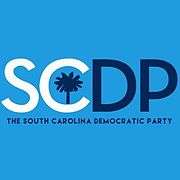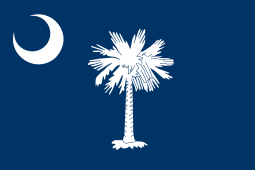South Carolina Democratic Party
The South Carolina Democratic Party is the South Carolina affiliate of the United States Democratic Party. It is headquartered in Columbia, South Carolina.
South Carolina Democratic Party | |
|---|---|
 | |
| Chairperson | Trav Robertson, Jr. |
| Senate Minority Leader | Nikki G. Setzler |
| House Minority Leader | J. Todd Rutherford |
| Headquarters | 1929 Gadsden Columbia, South Carolina |
| Ideology | Liberalism Centrism Social liberalism |
| Political position | Center to center-left |
| National affiliation | Democratic Party |
| Colors | Blue |
| Seats in the U.S. Senate | 0 / 2 |
| Seats in the U.S. House of Representatives | 2 / 7 |
| Statewide Executive Offices | 0 / 9 |
| Seats in the South Carolina Senate | 19 / 46 |
| Seats in the South Carolina House of Representatives | 44 / 124 |
| Website | |
| www | |
| |
History
The Democratic Party thrived as the conservative faction during the Second Party System between 1832 and the mid-1850s and was one of the causes of the collapse of the Whig Party.
Between 1880 and 1948, South Carolina's Democratic Party dominated state politics. The 1948 presidential election marked the winds of change as Strom Thurmond ran on behalf of the States' Rights Democratic Party (Dixiecrats). He accumulated 71% of the votes cast in South Carolina that year.[1]
Nearly 100 years after the conclusion of the Civil War (around 1949), the state was still preoccupied with racial tension, which muffled the debate about essentially all other issues. During this time, all politics revolved around the Democratic Party. Furthermore, a single faction typically dominated local politics. South Carolina was locked into the traditionalistic culture dominant throughout the South. Political change was often resisted by South Carolina's agrarian leaders. The agrarian leaders were middle-class farmers that were thought to maintain the status quo of the Democratic Party. For much of South Carolina's history, the lower class was generally not allowed to vote.[2]
In addition to resistance towards political change in the mid-1900s, South Carolina's Democratic party prevented African Americans from voting in the primary election, which prevented African Americans from having a meaningful vote in the election. Without a Republican candidate, the Democratic primary election acted as the presidential election.
A major shift began in South Carolina politics with President Lyndon B. Johnson's Civil Rights Act of 1964. Mirroring a trend with the national-level party, over time the SCDP shifted in focus from the conservative state's rights ideology that had defined it since its foundation to modern liberalism, while the Republican Party gradually became the bastion of conservatism.
Current elected officials
The South Carolina Democratic Party currently control none of the statewide offices and holds minorities in both the South Carolina Senate and House of Representatives. Democrats hold two of the state's seven U.S. House seats.
Members of Congress
U.S. Senate
Republicans have controlled both of South Carolina's seats in the U.S. Senate since 2004. Fritz Hollings was the last Democrat to represent South Carolina in the U.S. Senate. First elected in the 1966 special election, Hollings opted to retire instead of seeking a seventh full term. Superintendent of Education Inez Tenenbaum ran as the Democratic nominee in the 2004 election and was subsequently defeated by Republican challenger Jim DeMint.
- Class I: Tim Scott (Junior Senator)
- Class II: Lindsey Graham (Senior Senator, Chairman Senate Judiciary Committee)
U.S. House of Representatives
Out of the 7 seats South Carolina is apportioned in the U.S. House of Representatives, 2 are held by Democrats:
Statewide offices
- None
South Carolina has not elected any Democratic candidates to statewide office since 2006, when Jim Rex was elected as the Superintendent of Education. In 2010, Rex opted not to run for re-election, instead running unsuccessfully for the Democratic nomination for Governor. Former United States Deputy Secretary of Education Frank Holleman ran as the Democratic nominee and was subsequently defeated by Republican challenger Mick Zais.
State legislative leaders
Officers and staff
As of July 2019, the state party officers were:[3]
- Chair: Trav Robertson, Jr.
- 1st Vice Chairman: Lessie Price
- 2nd Vice Chairman: Anthony B. Thompson Jr.
- 3rd Vice Chairman: Scott Thorpe
- Secretary: Joyce Rose-Harris
- Treasurer: Kendra Dove
State Party Staff:[4]
- Executive Director: Jay Parmley
- Chief of Staff: Tim Sullivan
- Finance Director: Ellen Stankiewicz
- Director of Voter Protection: Shaundra Young Scott
- Deputy Director of Voter Protection: Eli Valentin
- Communications Director: Lauren Brown
- Political Director: Angela Clyburn
Members of the Democratic National Committee
Four members of the South Carolina Democratic Party also serve on the Democratic National Committee.[3] These are:
- State Rep. Gilda Cobb-Hunter
- Don Fowler
- Carol Fowler
- Clay Middleton
See also
References
- Bass, Jack. Thompon, Marilyn. "Strom". PublicAffairs, 2005.
- http://www.thestate.com/news/special-reports/state-125/article43721457.html
- http://scdp.org/party-leadership/
- http://scdp.org/staff/
External links
- South Carolina Democratic Party
- Democratic Party of South Carolina Records at the University of South Carolina's South Carolina Political Collections
